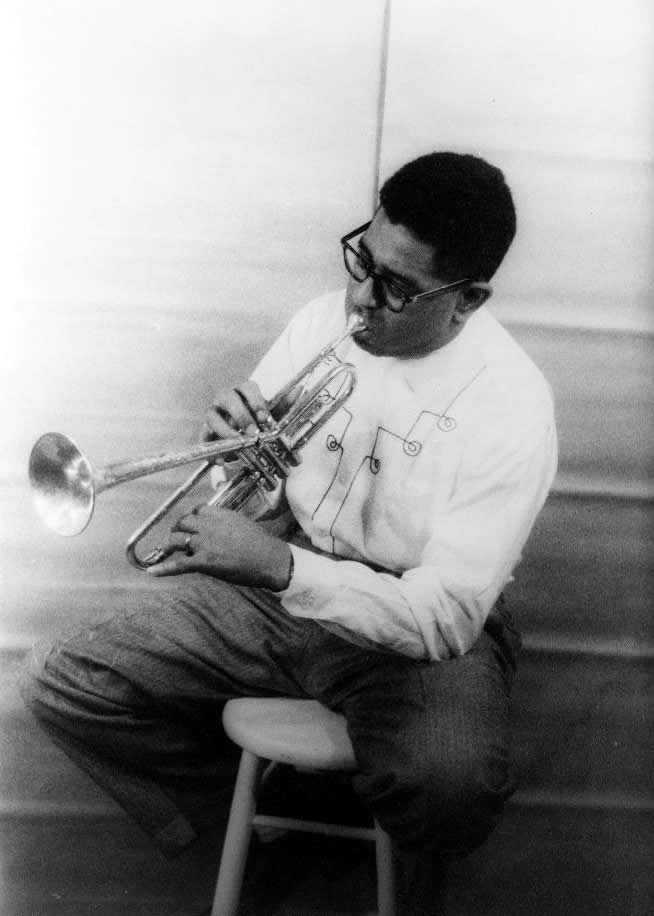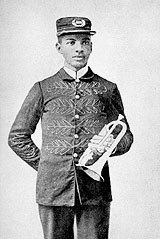|
Tin Tin Deo
"Tin Tin Deo" is a song composed by Dizzy Gillespie, Gil Fuller Walter Gilbert "Gil" Fuller (April 14, 1920, Los Angeles, California – May 26, 1994, San Diego, California) was an American jazz arranger. He is no relation to the jazz trumpeter and vocalist Walter Fuller (musician), Walter "Rosetta" Fuller. I ..., and Luciano "Chano" Pozo, first recorded on October 25, 1948. Along with Manteca, written in 1947, it is one of the foremost contributions of Gillespie to Afro-Cuban jazz. References {{reflist Afro-Cuban jazz ... [...More Info...] [...Related Items...] OR: [Wikipedia] [Google] [Baidu] |
Dizzy Gillespie
John Birks "Dizzy" Gillespie (; October 21, 1917 – January 6, 1993) was an American jazz trumpeter, bandleader, composer, educator and singer. He was a trumpet virtuoso and improviser, building on the virtuosic style of Roy Eldridge but adding layers of harmonic and rhythmic complexity previously unheard in jazz. His combination of musicianship, showmanship, and wit made him a leading popularizer of the new music called bebop. His beret and horn-rimmed spectacles, scat singing, bent horn, pouched cheeks, and light-hearted personality provided one of bebop's most prominent symbols. In the 1940s, Gillespie, with Charlie Parker, became a major figure in the development of bebop and modern jazz. He taught and influenced many other musicians, including trumpeters Miles Davis, Jon Faddis, Fats Navarro, Clifford Brown, Arturo Sandoval, Lee Morgan, Chuck Mangione, and balladeer Johnny Hartman. He pioneered Afro-Cuban jazz and won several Grammy Awards. Scott Yanow wrote, "Dizzy ... [...More Info...] [...Related Items...] OR: [Wikipedia] [Google] [Baidu] |
Gil Fuller
Walter Gilbert "Gil" Fuller (April 14, 1920, Los Angeles, California – May 26, 1994, San Diego, California) was an American jazz arranger. He is no relation to the jazz trumpeter and vocalist Walter Fuller (musician), Walter "Rosetta" Fuller. In the 1930s and 1940s, Fuller did extensive work writing and arranging for bandleaders such as Les Hite, Jimmie Lunceford, Billy Eckstine, and Tiny Bradshaw; he also worked with Benny Carter, Benny Goodman, Woody Herman, Count Basie, Machito, and Tito Puente. After World War II, he found himself increasingly in demand as a bebop arranger, along with fellow modern arrangers Tadd Dameron, Gil Evans, and George Russell (composer), George Russell. Fuller's work with Dizzy Gillespie was of particular note, yielding the tunes "Manteca", "Swedish Suite", "Tin Tin Deo", and "One Bass Hit". He is the composer of the jazz standard ballad "I Waited For You", co-credited with Dizzy Gillespie. Fuller started his own publishing company in 1957, and whil ... [...More Info...] [...Related Items...] OR: [Wikipedia] [Google] [Baidu] |
Luciano "Chano" Pozo
Luciano Pozo González (January 7, 1915 – December 3, 1948), known professionally as Chano Pozo, was a Cuban jazz percussionist, singer, dancer, and composer. Despite only living to age 33, he played a major role in the founding of Latin jazz. He co-wrote some of Dizzy Gillespie's Latin-flavored compositions, such as " Manteca" and "Tin Tin Deo", and was the first Latin percussionist in Gillespie's band. Early life Luciano "Chano" Pozo González was born in Havana to Cecelio González and Carnación Pozo. Chano grew up with three sisters and a brother, as well as his older half brother, Félix Chappottín, who would later become one of the great Cuban '' soneros''. The family struggled with poverty throughout his youth. His mother died when Chano was eleven, and Cecelio took his family to live with his long-time mistress, Natalia, who was Felix's mother. Chano showed an early interest in playing drums, and performed ably in Afro-Cuban religious ceremonies in which drumming ... [...More Info...] [...Related Items...] OR: [Wikipedia] [Google] [Baidu] |
Manteca (song)
"Manteca" is one of the earliest foundational tunes of Afro-Cuban jazz. Co-written by Dizzy Gillespie, Chano Pozo and Gil Fuller in 1947, it is among the most famous of Gillespie's recordings (along with the earlier " A Night in Tunisia") and is "one of the most important records ever made in the United States", according to Gary Giddins of ''The Village Voice''. "Manteca" is the first tune rhythmically based on the clave to become a jazz standard. History In 1947, Gillespie asked Mario Bauzá to recommend a Cuban percussionist for his big band. Bauzá suggested Pozo, a rough-living percussionist already famous in Cuba, and Gillespie hired him. They began to work Pozo's Cuban-style percussion into the band's arrangements. The band was touring in California when Pozo presented Gillespie with the idea for the tune. It featured a bridge of two eight-bar trumpet statements by Gillespie, percussion patterns played by Pozo, and horn lines from Gillespie's big band arranger Walter "Gil" ... [...More Info...] [...Related Items...] OR: [Wikipedia] [Google] [Baidu] |
Afro-Cuban Jazz
Afro-Cuban jazz is the earliest form of Latin jazz. It mixes Afro-Cuban clave-based rhythms with jazz harmonies and techniques of improvisation. Afro-Cuban music has deep roots in African ritual and rhythm.{{cite web, Cuba: Son and Afro-Cuban Music, https://worldmusic.net/blogs/guide-to-world-music/cuba-son-and-afro-cuban-music Afro-Cuban jazz emerged in the early 1940s with the Cuban musicians Mario Bauzá and Frank Grillo "Machito" in the band Machito and his Afro-Cubans in New York City. In 1947, the collaborations of bebop trumpeter Dizzy Gillespie and percussionist Chano Pozo brought Afro-Cuban rhythms and instruments, such as the tumbadora and the bongo, into the East Coast jazz scene. Early combinations of jazz with Cuban music, such as " Manteca" and "Mangó Mangüé", were commonly referred to as "Cubop" for Cuban bebop.{{cite book , last=Fernandez , first=Raul A. , title=From Afro-Cuban Rhythms to Latin Jazz , url=https://books.google.com/books?id=6WO7YevK_18C&pg=PA6 ... [...More Info...] [...Related Items...] OR: [Wikipedia] [Google] [Baidu] |


